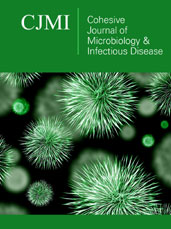- Submissions

Abstract
Cohesive Journal of Microbiology & Infectious Disease
Epigenetic Mechanisms Linking COVID-19 and Diabetes: Implications for Metabolic Health
-
Open or CloseSwarup K. Chakrabarti1* and Dhrubajyoti Chattopadhyay1,2
1H.P.Ghosh Research Center, India
2Sister Nivedita University, India
*Corresponding author: Swarup K. Chakrabarti, H. P. Ghosh Research Center, HIDCO (II), EK Tower, New Town, Kolkata, West Bengal 700161, India
Submission: October 31, 2024;Published: December 09, 2024

ISSN: 2578-0190 Volume7 Issue3
Abstract
The COVID-19 pandemic has profoundly impacted global health, particularly among vulnerable populations with preexisting conditions such as diabetes. This review examines the intricate relationship between COVID-19, diabetes, and epigenetic modifications. It seeks to elucidate how SARSCoV- 2 infection exacerbates insulin resistance, disrupts glucose homeostasis, and induces persistent alterations in epigenetic expression, including fluctuations in microRNA levels that may heighten the risk of developing diabetes and long COVID. SARS-CoV-2 exploits host cellular mechanisms, leading to sustained inflammation and the dysregulation of critical metabolic pathways. This disruption adversely impacts the functionality of pancreatic β-cells and impairs insulin secretion. The virus causes changes in DNA methylation patterns, alters histones, and disrupts microRNA regulation, which results in insulin resistance and inflammation, highlighting the complex connection between these conditions. Recent research suggests that these epigenetic modifications might persist for a prolonged duration following the initial infection, which could lead to lasting symptoms of COVID-19, particularly those that impact metabolic functions. This literature-based narrative review is important because it deepens our comprehension of the essential epigenetic mechanisms linking COVID-19 and diabetes, highlighting the enduring impact of the pandemic on at-risk groups. Identifying specific epigenetic markers, such as microRNAs, can guide public health strategies and aid in the creation of targeted treatments for these unique conditions. In the end, encouraging cooperation between fundamental research and clinical environments will be crucial for successfully converting these discoveries into effective prevention and treatment strategies. Collaboratively, this comprehensive approach is essential for addressing the intertwined health challenges posed by COVID-19 and diabetes, ultimately safeguarding the health of affected individuals and shaping future public health policies.
Keywords:Virus; Covid-19; miRNAs; Cytokines; Β-Cells; Epigenetic; Chronic illnesses; Obesity; Diabetes
 a Creative Commons Attribution 4.0 International License. Based on a work at www.crimsonpublishers.com.
Best viewed in
a Creative Commons Attribution 4.0 International License. Based on a work at www.crimsonpublishers.com.
Best viewed in 







.jpg)






























 Editorial Board Registrations
Editorial Board Registrations Submit your Article
Submit your Article Refer a Friend
Refer a Friend Advertise With Us
Advertise With Us
.jpg)






.jpg)














.bmp)
.jpg)
.png)
.jpg)










.jpg)






.png)

.png)



.png)






